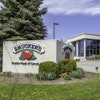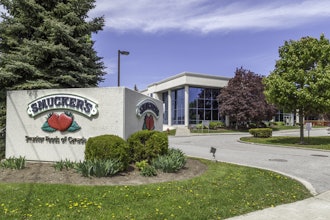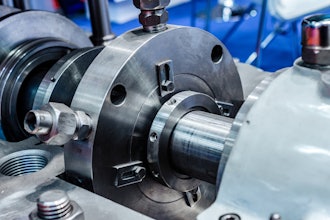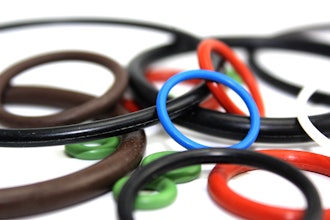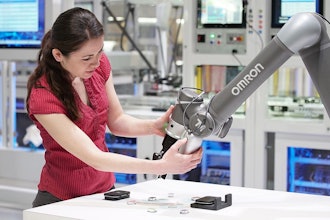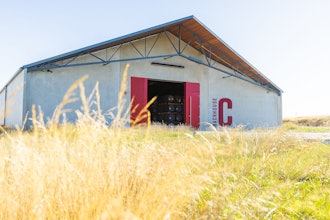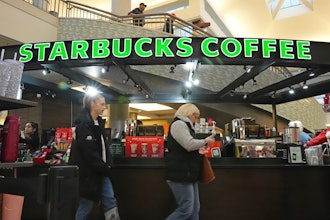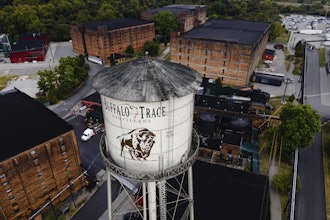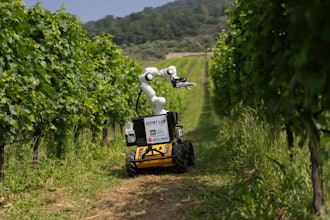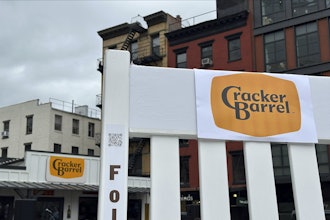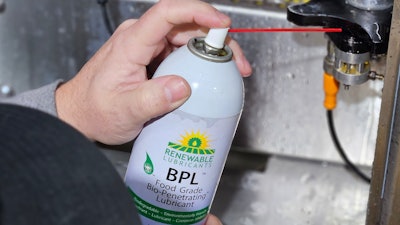
Behind every great brew is a carefully maintained production line.
The Brewer’s Association reported retail sales for small and independent brewers approached $30 billion last year. For breweries, keeping the equipment running smoothly is essential — not just for efficiency, but to prevent loss, avoid contamination, and ensure product consistency.
At Olde Mother Brewing Company in Frederick, Maryland, owner Keith Marcoux knows firsthand how small changes can make a big difference. When a sticky carousel mechanism in their canning line caused downtime and waste, they needed a food-safe, effective lubrication solution. Thanks to Renewable Lubricants’ Bio-Penetrating Lubricant (BPL) Food Grade Aerosol, they were able to end their startup issues, eliminate waste, and improve functionality, all while keeping the beer fresh and the team safe.
A Brewery Built on Passion and Growth
Olde Mother was founded in 2015. What began as a passion project soon evolved into a grassroots craft beer brand that has become a staple of Frederick, Maryland’s local scene. They started with a custom-built 55-gallon brewing system in an 1,800 square foot space and have quickly grown in popularity. Nearly ten years later, they’ve expanded to a 10,000 square foot facility with a 10-barrel brewhouse, turning out a thousand barrels of production a year. The direct-fired brew house has a two-vessel system with a mash tun and boil kettle, along with extra fermentation vessels and bright tanks for conditioning. They’ve also added a packaging line, and the brew pub serves food alongside a full selection of beers. Known for their bold experimentation and diverse lineup, they offer everything from traditional lagers and stouts to creative, fruit-infused sours and hop-forward IPAs.
With over 9,736 small and independent breweries operating in the United States as of 2024, competition in the craft beer industry is intense. Challenges to efficient production are nearly constant. Supply chain concerns and equipment maintenance can drive up expenses and tighten the margins. There’s also a newer interest in health-conscious and experimental beers, pushing breweries to invest in innovation while simultaneously keeping costs down. Developing new recipes, upgrading equipment, and meeting evolving industry regulations all require capital. Any waste in the brewing process, whether it’s due to inefficiencies, lost product, or unplanned downtime can quickly add up. These costs make workplace precision critical to financial sustainability. Breweries like Olde Mother stay ahead by ensuring product quality, regulatory compliance, and efficiency to protect their bottom line.
The Problem: Sticking Parts, Downtime, and Waste
Olde Mother’s packaging line puts the beer into 12-ounce cans at about 30 cans a minute, completing 100 to 150 cases of beer a week. The packaging line relies on precise timing, and many small moving parts must be kept lubricated. Any delay or mechanical issue can lead to misaligned cans, waste, and lost production time. Recently, a major issue was the lid pick apparatus and carousel mechanism. Those parts control the movement of filled cans before sealing, but the small pneumatic valves inside the carousel kept sticking.
“We normally were using isopropyl alcohol and hot water, trying to do a thorough cleaning. But those parts are so hard to reach. It just wasn’t solving the problem,” says Marcoux.
Every morning, during startup, multiple cans were lost as the system “warmed up.” The team needed a better way to prevent the sticking points and ensure a smooth start to production.
The Solution: Food-Grade Lubrication in an Easy-to-Use Aerosol
While traveling through Frederick, Marcoux’s old Air Force buddy Ben Garmier reached out so the two veterans could catch up. During the visit, Garmier also gave Marcoux some samples of Renewable Lubricants’ Bio-Penetrating Lubricant Food Grade Aerosol to try.
“Food grade lubricant in aerosol is a game changer,” Marcoux says, sharing that the brewery quickly saw real benefits.
The aerosol application made it especially easy to reach tight spaces that traditional grease and manual lubrication methods just couldn’t. Since it is food-grade, tasteless, and odorless, there was no risk of flavor or aroma contamination of the beer, either. The lubricant significantly reduced their startup waste by eliminating the dozens of product cans that were previously lost each morning due to sticking parts. It also helped with preventative maintenance by keeping pneumatic components clean and moving freely.
“We can get into hard-to-reach places and apply the perfect amount of lubrication. No more sticky parts slowing us down,” says Marcoux.
Food-Safe, Eco-Friendly Lubricants Meet Safety Regulations
In addition to product quality, breweries must follow stringent food safety regulations that require them to identify potential contamination risks, establish preventive controls, and document their compliance efforts. Fortunately, BPL Food Grade lubricants are NSF H1 certified, making them safe for use in and around food processing areas. This is different from traditional petroleum-based lubricants. Food grade products can be used on food processing equipment as a protective anti-rust film, as a release agent on gaskets or seals of tank closures, and as a lubricant for machine parts and equipment in locations in which there is a potential exposure of the lubricated part to food. Their bio-based formula is engineered to prevent corrosion, lubricate efficiently, minimize contamination risks, and it contains no volatile organic compounds (VOCs).
By using BPL Food Grade Aerosol, Olde Mother not only ensured compliance with industry regulations, but they improved production. Switching to a bio-based product was more than just a supply upgrade, it provided a reliable, compliant, and environmentally responsible solution that aligns with both regulatory expectations and sustainability goals.
Olde Mother Brewing’s experience with BPL Food Grade Aerosol shows how a simple switch can lead to major improvements. The company now experiences less down time, waste, and frustration while ensuring longer equipment life and a safer workplace.
“It’s effective, easy to use, and gives us peace of mind. Plus, we can buy it online or through local distributors,” Marcoux notes, “so it’s always available when we need it.”
Every decision matters for breweries as they navigate tight margins, regulations, and the constant demand for efficiency. Investing in the right supplies helps build a stronger, more sustainable business. Whether it’s preventing production delays, maintaining product integrity, or supporting environmental responsibility, the right lubrication is a small but important factor that keeps a brewery running at its best.
Ben Garmier is the vice president of marketing and business development at Renewable Lubricants Inc.
